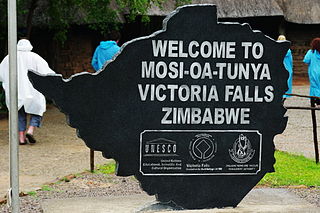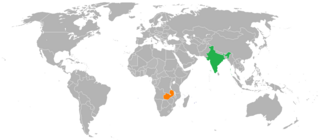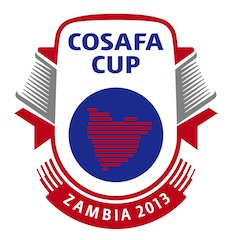
Zambia, officially the Republic of Zambia, is a landlocked country at the crossroads of Central, Southern and East Africa. It is typically referred to being in South-Central Africa or Southern Africa. It is bordered to the north by the Democratic Republic of the Congo, Tanzania to the north-east, Malawi to the east, Mozambique to the southeast, Zimbabwe and Botswana to the south, Namibia to the southwest, and Angola to the west. The capital city of Zambia is Lusaka, located in the south-central part of Zambia. The population is concentrated mainly around Lusaka in the south and the Copperbelt Province to the north, the core economic hubs of the country.

The history of Zambia experienced many stages from colonisation to independence from Britain on 24 October 1964. Northern Rhodesia became a British sphere of influence in the present-day region of Zambia in 1888, and was officially proclaimed a British protectorate in 1924. After many years of suggested mergers, Southern Rhodesia, Northern Rhodesia, and Nyasaland were merged into the British Federation of Rhodesia and Nyasaland.

The President of the Republic of Zambia is the head of state and head of government of Zambia and is the highest executive authority in the country. The President is elected by popular vote for a five-year term and is responsible for the administration of the government, overseeing the implementation of national policies, and representing Zambia in international affairs. The office was established at Zambia's independence in 1964. The current President is Hakainde Hichilema, who assumed office on August 24, 2021, following the 2021 presidential election where his party, the United Party for National Development, won a majority. The President's role includes appointing the Cabinet, serving as Commander-in-Chief of the Zambian Defence Force, and ensuring the enforcement of laws.

Chipata is a city and administrative centre of the Eastern Province of Zambia and Chipata District. It was declared the 5th city of the country, after Lusaka, Ndola, Kitwe and Livingstone, by President Edgar Lungu on 24 February 2017. The city has undergone rapid economic and infrastructure growth in the years, leading up to city status.

The University of Zambia (UNZA) is a public university located in Lusaka, Zambia. It is Zambia's largest and oldest learning institution. The university was established in 1965 and officially opened to the public on 12 July 1966. The language of instruction is English.
Goffals or Coloured Zimbabweans are persons of mixed race, predominately those claiming both European and African descent, in Malawi, Zambia, and, particularly Zimbabwe. They are generally known as Coloureds, though the term Goffal is used by some in the Coloured community to refer to themselves, though this does not refer to the mixed-race community in nearby South Africa. The community includes many diverse constituents of Shona, Northern Ndebele, Bemba, Fengu, British, Afrikaner, Cape Coloured, Cape Malay and less commonly Portuguese, Greek, Goan, and Indian descent. Similar mixed-race communities exist throughout Southern Africa, notably the Cape Coloureds of South Africa.

Michael Charles Chilufya Sata was a Zambian politician who served as the fifth president of Zambia from 2011 until his death in 2014. A social democrat, he led the Patriotic Front (PF), a major political party in Zambia. Under President Frederick Chiluba, Sata was a minister during the 1990s as part of the Movement for Multiparty Democracy (MMD) government. He went into opposition in 2001, forming the PF. As an opposition leader, Sata – popularly known as "The King Cobra", emerged as the leading opposition presidential contender and rival to President Levy Mwanawasa in the 2006 presidential election, but was defeated. Following Mwanawasa's death, Sata ran again in 2008, losing to Rupiah Banda.

Rupiah Bwezani Banda was a Zambian politician who served as the fourth president of Zambia from 2008 to 2011, taking over from Levy Mwanawasa. Banda was an active participant in politics from early in the presidency of Kenneth Kaunda, during which time he held several diplomatic posts.

The following outline is provided as an overview of and topical guide to Zambia:

Many languages are spoken, or historically have been spoken, in Zimbabwe. Since the adoption of its 2013 Constitution, Zimbabwe has 16 official languages, namely Chewa, Chibarwe, English, Kalanga, Koisan, Nambya, Ndau, Ndebele, Shangani, Shona, sign language, Sotho, Tonga, Tswana, Venda, Xhosa. The country's main languages are Shona, spoken by over 70% of the population, and Ndebele, spoken by roughly 20%. English is the country's lingua franca, used in government and business and as the main medium of instruction in schools. English is the first language of most white Zimbabweans, and is the second language of a majority of black Zimbabweans. Historically, a minority of white Zimbabweans spoke Afrikaans, Greek, Italian, Polish, and Portuguese, among other languages, while Gujarati and Hindi could be found amongst the country's Indian population. Deaf Zimbabweans commonly use one of several varieties of Zimbabwean Sign Language, with some using American Sign Language. Zimbabwean language data is based on estimates, as Zimbabwe has never conducted a census that enumerated people by language.
The Indian presence in what is now Zimbabwe dates back to 1890 or earlier. Some scholars have suggested the similarities of the gold mining techniques carried out in southern Zimbabwe during ancient periods with the Indian ones, a brass cup of Hindu workmanship dated to 14th or 15th century AD has been found in Zimbabwean workings. During colonial period Indian plantation workers in South Africa crossed the border into Southern Rhodesia. A voluntary wave of Indian migrants also came at this time from the east, made up mostly of Gujarati men crossing the Indian Ocean to look for new opportunities. These men landed in Beira in Mozambique. Finding that immigration restrictions made it difficult for them to go to South Africa, they made their way across Mozambique, ending up what was then Southern Rhodesia. Further immigration was restricted in 1924 when the colony became a self-governing colony of the United Kingdom. The next year, entry of Indian migrants was restricted to wives and minor children of existing residents, with exceptions made on occasion for teachers and priests.

Lusaka is the capital and largest city of Zambia. It is one of the fastest-developing cities in southern Africa. Lusaka is in the southern part of the central plateau at an elevation of about 1,279 metres (4,196 ft). As of 2019, the city's population was about 3.3 million, while the urban population is estimated at 2.5 million in 2018. Lusaka is the centre of both commerce and government in Zambia and connects to the country's four main highways heading north, south, east, and west. English is the official language of the city administration, while Bemba and Nyanja are the commonly-spoken street languages.
Dipak Kumar A. Patel is a Zambian politician of Hindu Indian origin. His ancestral roots traces back to Gujarat, India. He served long tenures both as a legislator and as the Minister of Trade, Commerce, and Industry.
The Zambia National Broadcasting Corporation (ZNBC) is a Zambian television and radio station, formerly state owned, now technically a statutory body but still essentially under government control. It is the oldest, widest, and largest radio and television service provider in Zambia. It was established by an Act of Parliament in 1987, which was passed to transform the Zambia Broadcasting Services from being a Government Department under the Ministry of Information and Broadcasting Services into a statutory body called the Zambia National Broadcasting Corporation.
David Phiri was a Zambian businessman who was a former Governor of the Central Bank of Zambia. He was also Chairman of the Football Association of Zambia.

India–Zambia relations are bilateral diplomatic relations between India and Zambia. India maintains a High Commission of India in Lusaka that is concurrently accredited to Malawi while Zambia has a High Commission in New Delhi.

The 2013 COSAFA Cup, sponsored by South African Breweries and officially named the 2013 COSAFA Castle Cup, was the 14th edition of the COSAFA Cup, an international football competition consisting of national teams of member nations of the Council of Southern Africa Football Associations (COSAFA). It was hosted by Zambia in July 2013.

The history of the Jews in Zambia goes back to the early 1900s. Jews were always a small community with a notable role in Zambian history. The history of the Jews in Zambia dates to 1901 when it was still under British Colonial rule. Northern Rhodesia was colonized in the 1890s by the British South Africa Company, otherwise known as BSAC. Initially, Northern Rhodesia was split into North-eastern and North-western Rhodesia. However, the BSAC united them in 1911 to form Northern Rhodesia, which has its capital in Livingstone, near Victoria Falls. Among the population of 1 million people, there were 1,500 white residents in Northern Rhodesia, of whom many were the Jewish settlers. Northern Rhodesia became under British Colonial Rule partially so that the British Government could increase the number of white individuals and settlers in the country, which would contribute to a wider strategy to increase the influence that the British has between Kenya and South Africa. The Jewish settlers were one of the dominant ethnic groups and became highly involved in local politics, with prominent Jewish figures driving the push for Zambian independence and African nationalist rhetoric. Northern Rhodesia’s fertile land, World War II, and independence from the British Colonial rule all had a profound impact on both immigration and emigration of Jewish refugees. The Jewish diaspora introduced trade and commerce into the region in both regional and urban areas through cattle trading, ranching, mining, communication networks, storefronts, transport, and butchery, amongst others. The Jewish settlers, whether they are Jewish through origin, birth, marriage, or confession, all formed a small, yet strong community. The Jews in Zambia were a Jewish diaspora cultural and religious settler minority group, which raises concerns about the notion of who is the coloniser, who is the colonised, who is the victim and who is the oppressor. This deems that it can be studied through a postcolonial framework. Following Zambia's independence in 1964, there was a large exodus of Jews and white individuals from the country. In 2022, there remains less than fifty Jews in Zambia.After existence for 130 years as of 15 June 2024 the total of Jews in Zambia numbers 11
Cinema of Zambia refers to the cinema and film industry of the country of Zambia.












